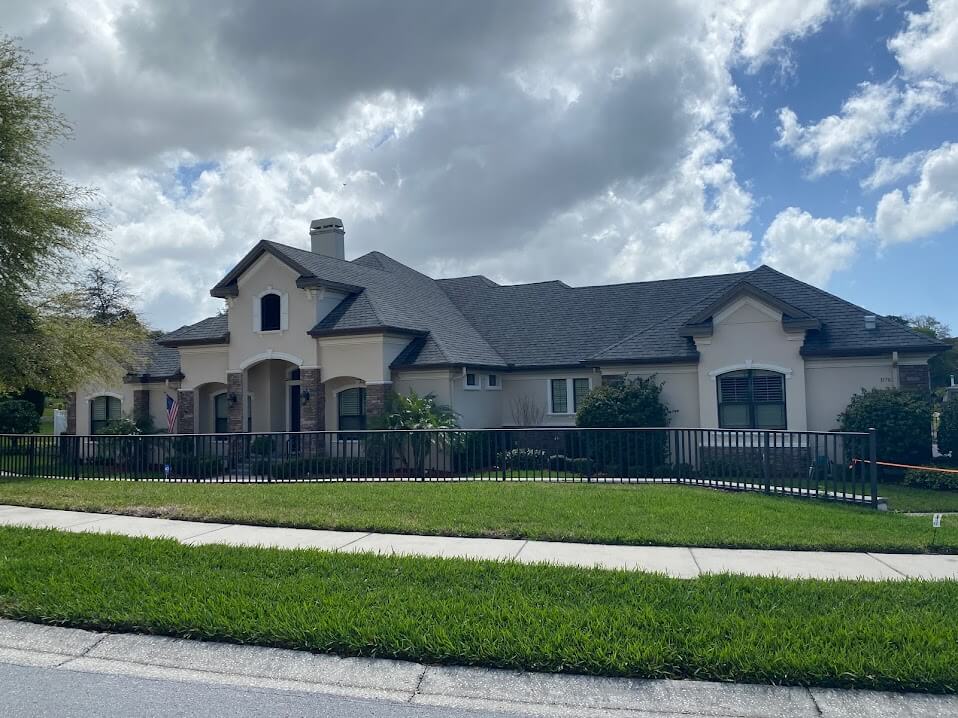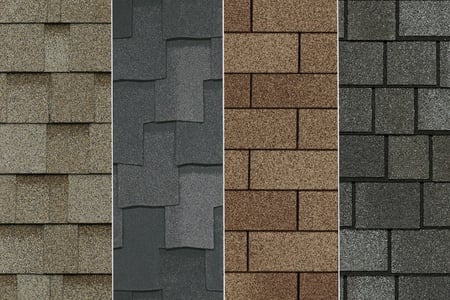
So, you’re in the market for new shingles, which is exciting stuff! But let’s be honest: when you hear asphalt shingles, what do you picture? If your mind draws a blank, you’re not alone.
Many homeowners find themselves overwhelmed by the sheer number of roofing options available today. With different materials, colors, patterns, and styles to choose from, it can be tough to know what’s best for your home. But don’t worry, shingle roofing doesn’t have to be complicated.
Asphalt shingles remain one of the most popular roofing materials in the U.S., and for good reason. They’re affordable, widely available, and come in a variety of styles. But like any material, they aren’t perfect, and it’s important to weigh the pros and cons before making a decision.
At RoofCrafters, we’ve been repairing and installing asphalt shingles for over 30 years, and we’ve seen the good, the bad, and everything in between. In this article, we’ll walk you through what asphalt shingles are, their potential drawbacks, and whether they could be a smart fit for your home.
What Are Asphalt Shingles?
As we mentioned earlier, asphalt shingles are one of the most favored roof types you see on homes today. This type of shingle is generally made up of three layers-
- Base mat
- Waterproof asphalt
- Ceramic granules
The ceramic granules on top protect the shingle from UV rays. There are also two types of asphalt shingles- fiberglass and organic. Fiberglass is durable and lightweight, while organic shingles, made of cellulose fibers, are thick and flexible.

While organic asphalt shingles are more hardwearing, they are also more costly and have more of a negative impact on the environment because they contain more asphalt than the fiberglass option. Fiberglass shingles have a better fire rating, along with being more lightweight and costing less.
Asphalt shingles are manufactured in a few different designs- three-tab, architectural, and designer.
Three-tab shingles get their name from having one piece of material that has vertical slits in the bottom to create tabs that look like three different shingles. They are the most budget-friendly choice.
Architectural shingles, also called laminated shingles, don't have cutouts as three-tab shingles do. Instead, they contain multiple layers of material to create more of a dimensional look.
Designer shingles are thicker and made to add more curb appeal to your roof. They're generally very luxurious and can make any roof pop. Designer shingles mimic the look of slate to give the illusion that they are more expensive.
Now that you know just a little bit more about what asphalt shingles are, what are their disadvantages?
The Drawbacks of Asphalt Shingles?
Though asphalt shingles aren't an unusual choice among homeowners, there are a few things that you should consider before choosing them. This isn't to say they're "bad," it's just better to know all the facts before picking a new roofing material.

Prone to Cracking
Because asphalt shingles are lightweight, they have a tendency to crack, especially when they receive extreme temperature fluctuations. Profound temperature changes cause the shingles to expand and contract, causing cracking.
Temperatures in the high 90s to 100s can also influence cracking in asphalt shingles. Three-tab shingles are the most known for splitting because they're the cheapest variety of this type of roofing material.
Limited Visual Appeal
If you want your home to truly stand out, three-tab shingles, in particular, are not the way to go. However, this is a trendy option amongst homeowners in suburban areas, which is part of the reason why homes in neighborhoods often look so similar to each other.
Most asphalt shingles don't offer the uniqueness that a roof made with wood shingles or metal would, so keep this in mind. This is more of an issue for some than it is for others, but it's still worth noting.
Susceptible to Wind Damage
If you live in an area that regularly experiences extreme weather events, asphalt shingles may not be your best bet. Wind can cause shingles to detach, making your roof vulnerable to leaks. Water leakage leads to a plethora of other issues like mold and mildew, animals and insects, and even rot.
Areas with milder weather are typically more suitable for less-costly asphalt shingles because the likelihood of damage is lower. Replacing shingles can be expensive, depending on what type you have.
Shorter Lifespan Compared to Other Materials
Most asphalt shingles are lighter, cheaper, and more prone to weather-related damage. This reduces the life of your shingles, meaning you may have to pay more in the long run, even if you've chosen an option that is less money up-front.
For example, three-tab shingles can last from 18-22 years, while metal roofs can last around 40-70 years. That's a pretty significant difference.
Are Asphalt Shingles a Good Fit for Your Home?

They could be! Even though they do have disadvantages, they're still a viable option for a large number of homeowners. The specific type of home you own, your geographical area, and your personal taste all help determine what roofing style you may ultimately choose.
Remember- just because a particular roofing material has cons doesn't mean it should automatically be disqualified. Taking some time to go over every option you have will help you narrow down your search. There's so much to choose from!
Before contacting just anyone to install new shingles on your roof, make sure to select a roofing company that you know will perform their duties to their best ability. Hiring a licensed professional will ensure that no matter what type of shingles you choose, you're going to get the best service imaginable.
Ready to Learn More?
You've officially filled your brain with new roofing information! So, where do you go from here? If you have questions or are ready to get in touch with an expert, RoofCrafters is delighted to assist you. We strongly suggest checking out our resources regarding asphalt shingles, including "Residential Shingle Roofing," to make sure you know everything there is to know about this roofing material.
Keep in mind that we've been in the roofing industry for almost three decades, so we've built quite an arsenal of information about roofing systems. To further your knowledge on roofs, the most important part of every home, head over to our learning center.
Here's the thing: at RoofCrafters, we know more than anyone that making decisions regarding your roof can be a little on the stressful side- perhaps even a tad overwhelming. We understand that finding solutions to issues with your roof may be the last thing on your mind.
Part of our mission is to let you know that there are dedicated professionals who will take the time to help you! If you want to get in touch with one of our friendly representatives, make your way over to our contact page. No matter what you're looking for, we'll ensure that we do all we can to serve you.
.
My name is Kevin Mills, and I am the lead estimator for RoofCrafters’ Tampa division. I’m originally from Michigan, and I enjoy hunting, fishing, and spending any free time outdoors. What I’m most passionate about, though, is helping business owners and homeowners alike achieve their roofing goals, all while providing a seamless customer journey.



